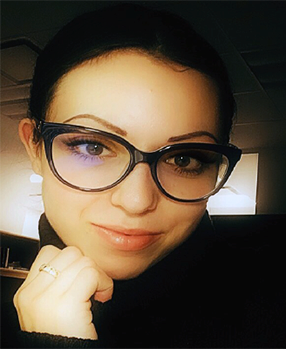FIMS News
Contact Information
FIMS Communications
Becky Blue
Email
519-661-2111x88493
FIMS & Nursing Building
Rm 2060C
Danica Facca: Forks in the road are just new opportunities to find your place

By Danielle McGlenister
Danica's hometown: Thunder Bay, Ontario
"Pursuing my PhD has made me pivot more than anything else in my life up until now, but I wouldn't trade it for anything less. I really like teaching--and the area that I'm in now of Digital Health is up and coming. So I feel like there's a lot of opportunity to do both innovative research and teaching." --Danica Facca
---
Danica has called Western University her home for the last nine years after falling in love with the campus. Originally applying in 2012 for a Bachelor’s in Psychology, Danica wanted to be a clinical psychologist as she was interested in understanding and helping people in vulnerable situations.
But, after her second year in the program, Danica didn’t find it as interesting as she thought it’d be. She decided a career pivot was her best move and transferred to an Honour’s Bachelor’s degree in English and Criminology to draw on her strengths as a writer and reader.
“It was at that point where I was like, ‘well, if I can't help people through psychology, I want to help them through law’”, Danica explains.
This passion for working with vulnerable populations led Danica to volunteer for a student-led local afterschool mentorship program called Learning it Together (LiT), which runs under Western’s Faculty of Health Sciences. Here, she began as a mentor for children in grades one to three and became the program’s Director by the time she was in the fourth year of her undergraduate degree.
“I oversaw a large executive team, around 250 Western student volunteers and 250 children, in addition to coordinating our program with the Thames Valley District School Board and London-Middlesex Community Housing. That’s where I met Dr. Lorie Donelle, my current PhD supervisor.”
Fun Fact
Danica spent over 10 years as a competitive ballet dancer in her youth.
When a program volunteer told Danica and the Executive team that a child had asked if they could become “friends” on Facebook, Danica became interested in studying the relationship between technology and children.
“We didn't have a proper program policy about online relationships between volunteers and the children. At the time I thought, ‘these kids are eight and nine—what do you mean they’re already into social media?’”
Danica shared these concerns with Dr. Donelle, who noticed there was a gap in the Canadian research literature regarding young children’s access to and use of digital technology and social media. She then offered Danica a research assistant opportunity to explore the relationship between children and digital technology through the LiT program as a pilot study.
In 2016, Danica enrolled in the Master of Arts in English at Western with a specialization in Transitional Justice and Post-Conflict Reconstruction program through the Faculty of Social Sciences, as she was still thinking of pursuing law. However, throughout her MA, she began to really build her professional relationship with Dr. Donelle and her interest in digital health continued to grow.
When it came time to decide if she wanted to pursue a PhD to further study children’s relationship with digital technology, Danica knew that if she was going to commit herself to four or five years of research work, it mattered that it was at Western because she and Dr. Donelle had already established the groundwork. Their productive working relationship and previously established pilot study gave them a head start in investigating how children and youth engage with digital technology and the consequences of those engagements.
“This whole idea of addressing digital health literacy and how it unfolds across different populations and generations – especially with children and youth - is where I think my heart really is,” said Danica. “And that’s something Dr. Donelle has always been fiercely supportive of.”
Under the leadership of Dr. Donelle, Danica is collaborating with a large multidisciplinary team of researchers across Western and the London community to investigate the multi-faceted use and impact of digital technology on key determinants of health among young Canadians. The group plans to use a large-scale, longitudinal, community-based cohort study to shed new light on how children and youth use technology, and how that usage affects their health and wellbeing.
Profiles in the Meet Our Students section are written by students in the Master of Media in Journalism & Communication program, who are enrolled in MMJC 9604 - Professional Writing.






